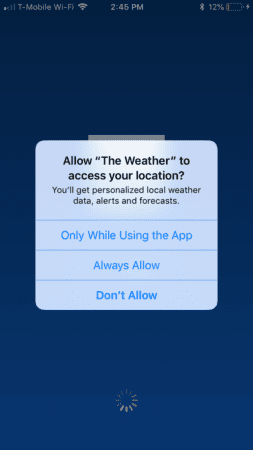Cloudy skies ahead: LA is suing the Weather Channel for selling user data


The city of LA is suing the Weather Company, a subsidiary of IBM, for secretly mining and selling user location data with the extremely popular Weather Channel App.
Stating that the app unfairly manipulates users into enabling their location settings for more accurate weather reports, the lawsuit affirms that the app collects and then sells this data to third-party companies.
“For years, TWC [the Weather Channel] has deceptively used its Weather Channel App to amass its users’ private, personal geolocation data—tracking minute details about its users’ locations throughout the day and night, all the while leading users to believe that their data will only be used to provide them with ‘personalized local weather data, alerts, and forecasts’,” the lawsuit alleges.

Citing a recent investigation by The New York Times that revealed more than 75 companies silently collecting location data (if you haven’t seen it yet, it’s worth a read), the lawsuit is basing its case on California’s Unfair Competition Law by stating that the use and sale of user location data is both “fraudulent and deceptive.”
Why location data is a heated issue
The ability to pinpoint a person’s exact location at any given time isn’t just scary, it’s dangerous. When your location is broadcast, you have no control over who can see it. Every movement, every mundane task is traced and logged. Even simple events like visiting a doctor, going to church, and more all become exposed with most of us never realizing it.
This type of privacy infringement could inadvertently expose a person’s political affiliation, sexual orientation, religion, and more.
“Think how Orwellian it feels to live in a world where a private company is tracking potentially every place you go, every minute of every day,” Los Angeles City Attorney Michael Feuer said. “If you want to sacrifice to that company that information, you sure ought to be doing it with clear and advanced notice of precisely what’s at stake.”
Setting the stage for future injunctions
https://twitter.com/CityAttorneyLA/status/1081964496464146432
While the business practices behind the Weather Channel app’s alleged collection and sale of user data may be illegal, it’s not unusual.
Companies like Facebook and Google routinely mine your location data, and while world leaders may eventually start cracking down on how companies collect and profit of your privacy (or lack thereof), there’s currently no real incentive for them to stop.
This lawsuit hopes to fine the Weather Company up to $2,500 for each violation of the Unfair Competition Law. With more than 200 million downloads and a reported 45+ million users, this could quickly become a sizeable sum.
But more than that, it could help set a precedent for future cases. As one Reddit user rightly pointed out, “A win here would translate into a much easier time getting other apps to stop doing that, because the law would be more clear on the practice.”
Don’t trust the weather(man)
IBM has been quick to defend their stance, stating “The Weather Company has always been transparent with use of location data; the disclosures are fully appropriate, and we will defend them vigorously.”
And while the Weather Channel’s Terms of Service does include a blurb on selling your location data, it’s not included within the Weather Channel App. Users need to manually search for the policy online and then parse through the convoluted ToS to see how their geo-location data is being sold for profit.
In the end, it comes to down to whether this is yet another case of deceptive privacy ploys. Fortunately, these underhand data-mining tactics could soon change: the California Consumer Privacy Act, which is set to go into effect in 2020, would make it harder for companies to blindly profit off customer data. And in Europe, the GDPR is already changing how companies handle privacy.
Regardless of how the lawsuit plays out, it should serve as a reminder that no app or service, no matter how innocuous it may seem, should be trusted openly. Your privacy is priceless, and it’s essential that you protect it.
Take the first step to protect yourself online. Try ExpressVPN risk-free.
Get ExpressVPN



